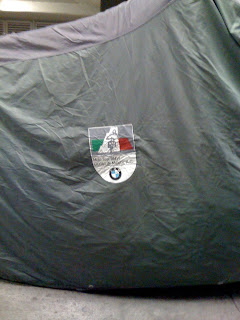The word
don in Spanish is an honorary title for men, as in Don Felipe or Don José or Cervantes's Don Quixote. The women's equivalent is
doña. But
don also means a special gift or talent, as in the phrase
don de gente to describe a "people" person like Bill Clinton, or
don de la palabra, sometimes translated as the "gift of gab" but more like the gift of being well spoken and expressive.
Don Pablo Ramírez, "La Torre de Jalisco," is someone who definitely has
el don de la palabra. Jalisco, Mexico-born Ramírez, a long-time resident of the Univisión channel's
República Deportiva, is one of the
comentaristas for the World Cup soccer games. Listening to the games in English is, frankly, listless and clinical. Listening to them in Spanish on Univisión is just as analytical but much more fun, and not only because of don Pablo's famous phrase "
gol. [big breath] ¡¡¡GOOOOOOOOOOOOOOOOOOOOOOOOOOOOOOOOOOOOOOOOOOOOOOL GOL GOL GOL GOL GOL AZO AZO AZO GOLAZO GOLAZO!!!"
I've had memorable communal experiences watching World Cup games in Mexico (1990, 1998, 2002) and Spain (1994): listening to verbose TV commentators and bombastic viewers gathered in hotel lobbies, corner bars, restaurants, or private residences, with beer or coffee (depending on the hour of the day) flowing in abundance. Here in the States, don Pablo exemplifies soccer commentary in the Spanish and Portuguese-language tradition, with a penchant for witty phrases and intriguing imagery. For example, at one point in a recent game in this 2010 edition of the World Cup, to describe a failed head-butt attempt for what would have been the team's third goal, don Pablo elaborated the following metaphor: "
¡IBA a meter el tercer CLAVO al ataúd! ¡Pero no sacó el MARTILLO a tiempo!" meaning that the player was going to put the third nail (goal) in the coffin (the other team was losing) but he didn't get out the hammer (his head) in time!
Describing a beautiful Brazilian goal exemplifying that nation's
jogo bonito tradition, he enthused, "
¿Quién DICE que para apreciar una obra de ARTE tienes que ir al museo o al teatro? AQUI estamos VIENDO que nomás hace falta un balón y un BUEN jugador!" (Who says you have to go to a museum or theater to appreciate a work of art? Here we're seeing that you only need a ball and a good player!) You want literary allusion? Praising a formidable goalie, he compared him to "
el Can Cerberos," or Cerberus, the three-headed canine guardian of Hades, while discreetly explaining the mythological reference "
cortesía de Univisión." He frequently takes the name of his colleague, "El Profe" Bracamontes, "in vain" to dramatically invite his opinion, yelling "
¡Háblame Jesús!" which means "Speak to me, Jesus (Bracamontes)!"
One more masterful example: After a ¡GOOOOOOOOOOL!, don Pablo added "
¡¡¡LO COLOCO LO COLOCO LOCOLOCOLOCOLOCO!!!" This is a terrific play on words which, slightly altering the G of
GOL to a C, takes on at least three meanings: "lo colocó" (he placed it), "lo coló" (he slid it in), and of course "loco."(I don't remember which game this was, but if it was a goal made by the Chilean team, then there would be a fourth meaning as well: Colo-Colo, Chile's best known soccer club, from which several of the national team players come.)
Sin DUDA los comentarios de DON PABLO hacen mucho más ALEGRE el juego, ¡hasta el partido más DESABRIDO!















